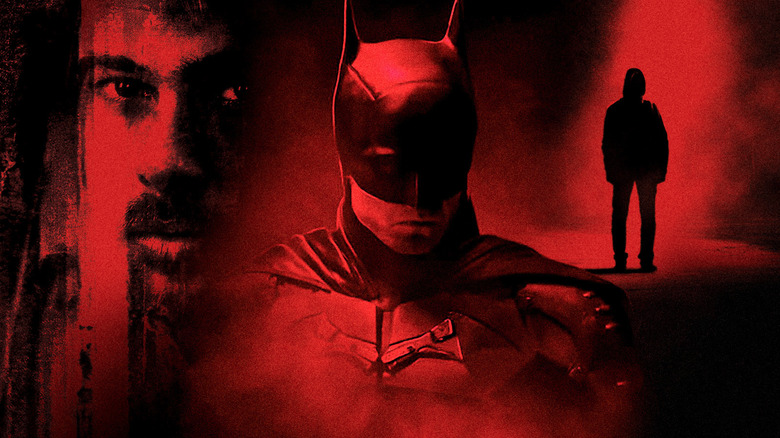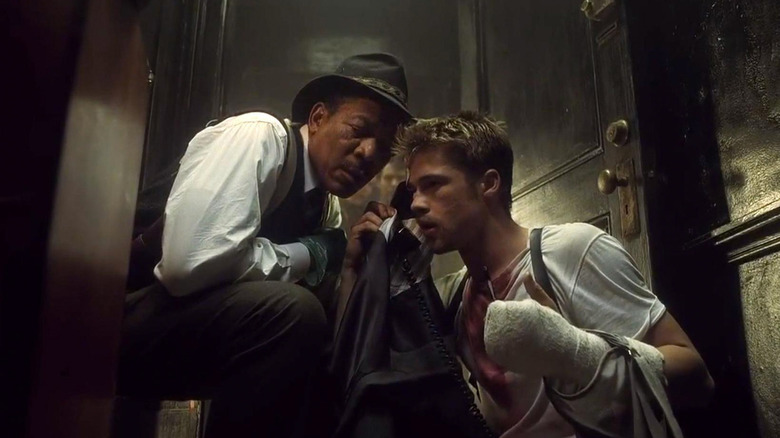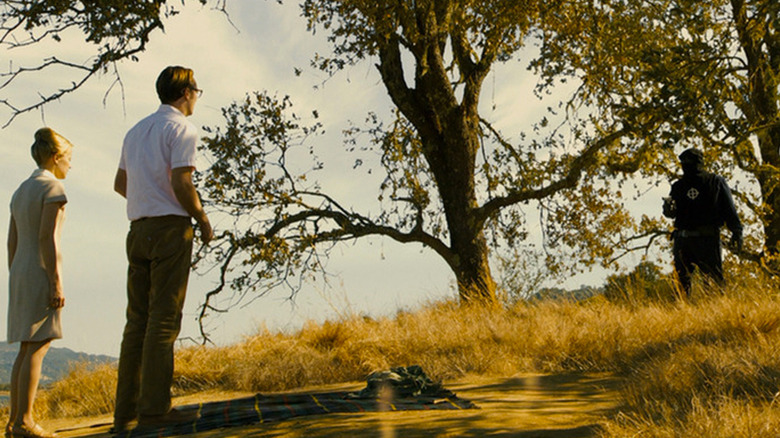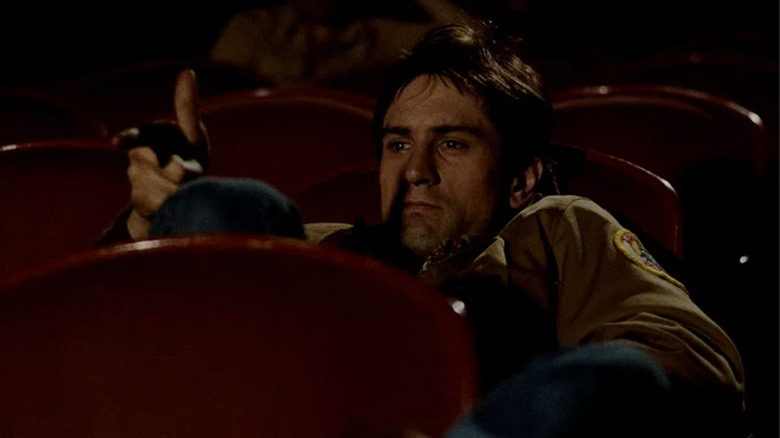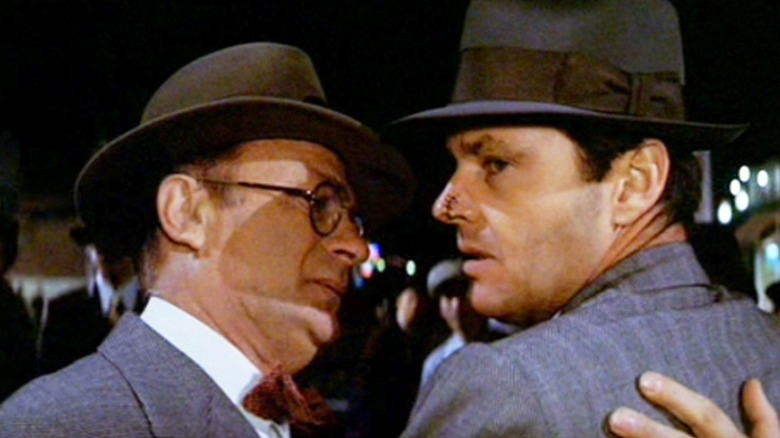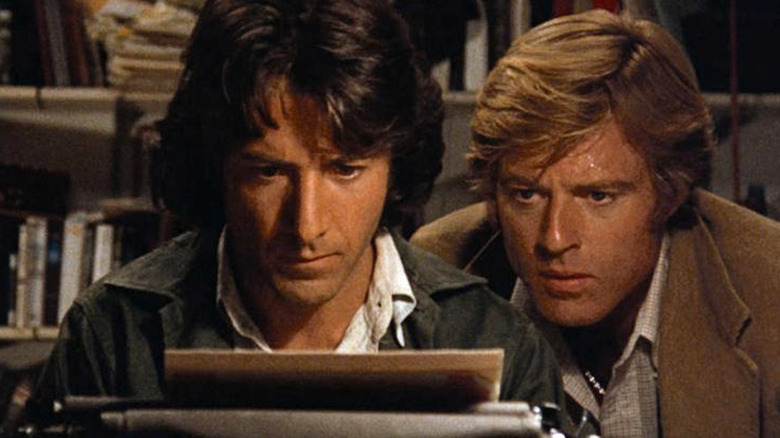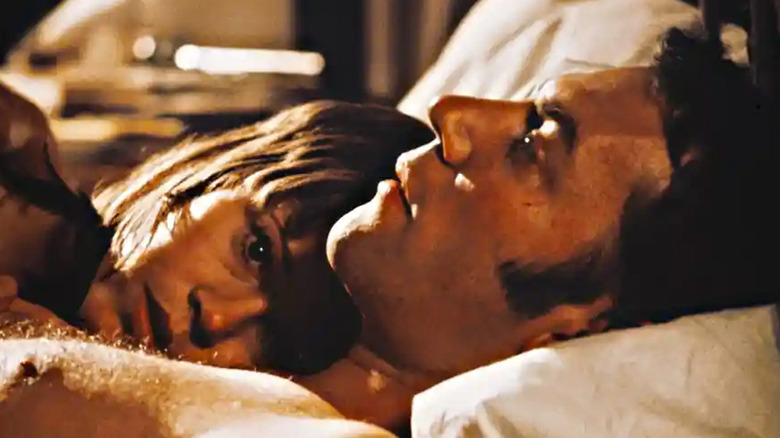The Movies That Inspired The Batman
From the moment director Matt Reeves first came aboard "The Batman," the conversation has leaned heavily on the director's many influences. Reeves and his muse Robert Pattinson have spoken at length about their many sources of inspiration for the forthcoming film, which could effectively set "The Batman" apart from past iterations and (hopefully) cure our franchise fatigue once and for all.
In that sense, the film absolutely delivers. "The Batman" is more moodboard than movie, but that might be exactly what Batman needs. Reeves steeps his crusader in a complex world that feels at once familiar and totally alien — and borrows a few familiar film motifs to get audiences up to speed. It helps that Reeves has listed his inspirations so publicly and frequently; not only does it prepare audiences accordingly (and build a fair amount of hype), it also softens the blow of such a drastically different Batman.
Which films actually influenced "The Batman"? Let's break down Reeves' inspirations, and how well they translate to the superhero genre.
Se7en
Reeves definitely took a page or two from David Fincher's book on worldbuilding, and "The Batman" is all the better for it. The rundown streets of Gotham seem caked in the same grime as the unnamed city in "Se7en." Not even the perpetual downpour (a fixture in both films) can wash the cities clean. Then there's the perpetual darkness. Batman embodies the shadows of Gotham as a means to keep criminals in check, and cinematographer Greig Fraser wields them to the same effect. Like "Se7en" — and so many other crime thrillers — "The Batman" avoids any light that feels natural. Like Bruce Wayne himself, the film's perpetual darkness forces us all into nocturnal animals.
"The Batman" also scores big points for scaling back the titular hero's resources. Bruce Wayne is in year two of his exploits, which means he has to lean more on his talent for sleuthing than fancy gadgets or an abundance of allies. In "The Batman," Bruce only has Lt. James Gordon on his side, which adds to the feeling of being overwhelmed in a sea of corruption and crime.
Though the "good cop, crazy cop" dynamic has been hashed out in countless detective films over the years, the relationship between Batman and Jim Gordon owes a lot to "Se7en." Reeves' Riddler also shares an affinity for sin and revelation with Fincher's "John Doe." Then, of course, there's also his cryptic MO, which is strongly reminiscent of yet another Fincher classic...
Zodiac
On the big screen, the Riddler has become synonymous with Jim Carrey's pink-haired, scenery-chewing iteration from "Batman Forever." Depending on who you ask, his campy take translates effortlessly into any Batman film — but Matt Reeves was keen to take the character in another direction. In an interview with Empire Magazine, the director said that the Zodiac Killer was "the real-world analogy" this he used to ground this particular member of Batman's rogues' gallery. Riddler not only evokes the Zodiac's "crudely made costume," but also leaves cyphers behind for the Batman to crack.
The Riddler's reestablishment as a serial killer was one of the keys to grounding "The Batman" in its undoubtedly-scary roots. It was important for Reeves to strike a balance between that and the scope of a superhero film — but this is still a film about cosplaying crimefighters, so a few outlandish influences were necessary too.
Taxi Driver
It takes a lot of psychological trauma to drive someone to the desperate measures on display in Gotham City — and Batman stories are at their very best when addressing this truth plainly. The concept really got its start in Frank Miller's "Batman: Year One," the storyline that's widely regarded as Batman's best origin tale. Though Reeves cites "Year One" as a big influence for "The Batman," both he and Miller owe a lot to "Taxi Driver," the film on which the modern Batman ethos was built.
'70s noir is all-out obsessed with crime and its effects on the male psyche. Scorsese's street-level thriller (and its "hero," Travis Bickle) became something of a blueprint for the vigilante archetype. Its approach to mental illness and post-traumatic stress disorder also inspired Todd Phillips, the director of "Joker," who paid tribute to "Taxi Driver" in a much more explicit way.
Bickle is in no sense a good role model — in most other stories, he would certainly be the villain — but the unpolished way in which he tries to rid his city of crime is definitely something Reeves channeled for "The Batman." As Bruce grows more comfortable in his nocturnal persona, he keeps a thorough record of his progress. Like Bickle in "Taxi Driver," he even writes nightly in his journal. "He's trying to see what effect he can have on crime in the city," the director told Esquire, "the way that Dr. Jekyll charted his experiment and what was happening to himself.
Fortunately, this is where the analogy ends: Bruce shows a kind of restraint that neither Bickle nor the Joker are interested in. Reeves endows some of Bickle's worst attributes to the Riddler instead, making him the perfect incel-y foil for this grungy, journaling Batman.
Chinatown
Now, no one ever pulls Gordon aside to say "Forget it, Jim ... it's Gotham" in "The Batman" — but does anyone really need to? Gordon and his moody partner are waist-deep in a twisty-turny conspiracy that goes further than either thought possible. Batman has always had roots in noir, so it makes total sense that Reeves would look to one of the classics — but in drawing from "Chinatown," the director suggests that no one, not even Batman himself, is completely innocent.
"This idea of a place that is corrupt, and you try to swim against the tide in order to fight against it and make a difference, is quintessential Batman," Reeves told MovieMaker Magazine. True to form, Reeves' Batman certainly puts up a fight, but still finds himself overwhelmed on all sides, fighting the Riddler, the criminal underworld, and Gotham's police force. The corruption of the city touches everyone in some way or form — even his own family history. It challenges Bruce's binary view of good and evil in a way we rarely see outside of the comics, and imbues his crusade with a whole new sense of urgency.
All the President's Men
This same focus on conspiracy has to extend to "All the President's Men," a film that's widely regarded as one of the best detective films of all time. While "Chinatown" spun a fictional yarn about a crooked city, "President's Men" turns back time to the Nixon era, and the scandal that effectively ended his presidency. Robert Redford and Dustin Hoffman starred as two journalists working overtime to uncover the Watergate scandal, and their journey served as a major inspiration for Bruce Wayne and Lt. Gordon's working relationship.
Two other characters in "The Batman" also share a connection to Watergate. Gotham mayor Don Mitchell Jr. (Rupert Penry-Jones) shares a surname with Nixon's Attorney General John Mitchell. District Attorney Gil Colson (Peter Sarsgaard) evokes the name of Charles Colson, Nixon's political advisor and "hatchet man." That Gotham's mayor and D.A. become two of the Riddler's first victims is a thinly-veiled nod to the shady dealings at every level.
Klute
Noir as a whole can be a tricky genre for women. Typically, female characters fall into two camps: the femme fatale, or the virginal ingenue. Selina Kyle and her alter ego Catwoman are usually the former — but when written well, she subverts the worst trappings of the genre. In "Batman: Year One," Selina is first introduced as a sex worker, and though she eventually becomes Catwoman to chart a new path for herself, a number of the stories that follow focus on Selina's desire to protect other women.
"The Batman" neatly skirts over this chapter of Selina's backstory, instead placing her in close (but not too close!) proximity to other women who may or may not be sex workers. In "The Batman," Selina is a waitress at the Penguin's Iceberg Lounge, but her missing friend Annika and her late mother both worked as "waitresses" at the 44 Below (the even-more-shady club within the Iceberg Lounge). Reeves suggests, but never outright declares, that these women are involved in the sex trade — but suggestion is enough to color Bruce's opinion of Selina.
Reeves and Pattinson were both excited about portraying Bruce's underbaked theories of good and evil. As Pattinson told Den of Geek, "[Bruce] is committed so hard to Batman and this kind of really binary worldview ... there are only bad people and there's only total innocence. There's no one in between at all." It's Selina that eventually challenges this mindset, though Bruce does initially judge her and her lifestyle.
The dynamic between the Bat and the Cat is pulled generously from another '70s thriller, the Donald Sutherland/Jane Fonda neo-noir "Klute." Fonda won her first Academy Award for her portrayal of Bree, a New York City call girl who finds herself at the center of a missing person's case. Sutherland is Klute, the naive detective conducting the investigation. Like Bruce, Klute initially dismisses Bree, and judges her lifestyle accordingly. "He assumes because of the world she's in that she is a certain kind of person," Reeves says. "Yet he can't help but be drawn to her and he can't help but be affected by her."
"The Batman" is in theaters now.
